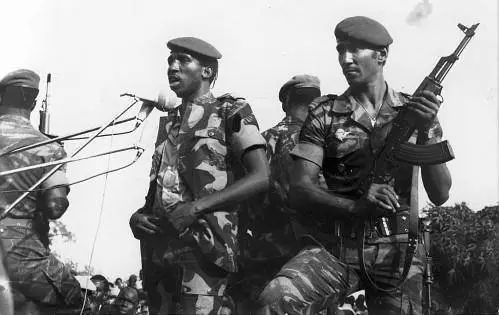
On the 3rd, of January 1966, the 1966 Upper Voltan coup d’état took place in the Republic of Upper Volta, now known as Burkina Faso. As a result of the popular large-scale protests, the military intervened against the government and forced President Maurice Yaméogo to resign. They replaced him with Lieutenant Colonel Sangoulé Lamizana.
Colonel Sangoulé Lamizana ruled until 1980 when another military coup d’état overthrew him. This coup d’état was the first in a long line of Upper Voltan and later Burkinabé coups, including the failed and successful ones. It marked the start of half a century of military rule.
The French Upper Volta had been decolonized in 1960, however, Maurice Yaméogo, who happened to be a close ally of the Ivorian President, Félix Houphouët-Boigny, created a single-party dictatorship, making his own Voltaic Democratic Union the exclusive lawful political party in the country.
The opposition parties had the choice of merging with it or getting dissolved. Maurice Yaméogo who previously adopted a pan-Africanist policy, to support the West African federation, eventually dropped the policies in favour of the anti-federalism of France and his friend, Houphouët-Boigny.

As a result of the President’s unfair policies, and extremely corrupt administration, he became very unpopular. In 1964, the government restricted the right of workers to organize strikes and outlawed labour strikes, making the strong trade unions its enemies. In the 1965 presidential election, Yaméogo was re-elected, with an alleged 100% support despite the 98.4% turnout.
He married a 22-year-old former beauty queen a few weeks after the October election. On 30th December, after an increase in the economic crises, the government announced a new budget that massively reduced the salaries of public sector employees while raising their taxes.
The following day, Denis Yaméogo, Minister of the Interior and Security, and the President’s half-brother used force to disassemble a meeting of the national labour administration and because of this, a general strike was called.
On 3rd January, the President was forced to resign and later imprisoned. The next day, a new military government came into power and they got the support of the trade unions as they ended the general strike.
The new military administration set 1970 as a deadline for the return to civilian governance.

